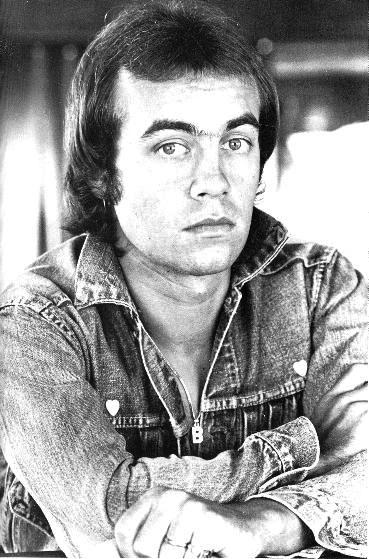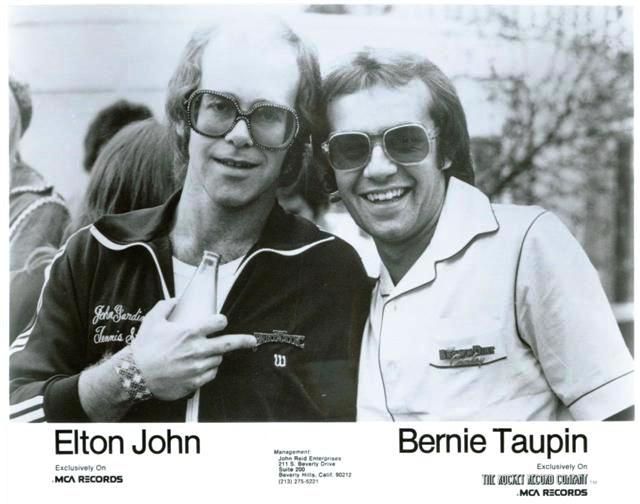 900 px.png)
|
Bernie Taupin
"We never collaborate on anything, it's purely a matter of giving him the lyrics, him working on them and the getting together afterwards. It wouldn't be easier to do it the other way round... I wouldn't have room to say anything..." Bernie Taupin Song List
English lyricist, poet, and singer, best known for his long-term collaboration with Elton John, writing the lyrics for the majority of the star's songs, making his lyrics some of the best known in pop-rock's history. In 1967, Taupin answered an advertisement in England's music paper New Musical Express that was seeking new songwriters. Around the same time Elton John submitted samples of his work to the paper, and the pair were brought together, collaborating on many projects since. Taupin was born at Flatters Farmhouse which is located between the village of Anwick and the town of Sleaford in the southern part of Lincolnshire, England. Of French ancestry, his father was educated in Dijon and was employed as a stockman by a large farm estate near the town of Market Rasen and his mother worked as a nanny, having previously lived in Switzerland. The family later relocated to Rowston Manor, a significant step up from Flatters Farmhouse which had no electricity. Taupin's father decided to try his hand at independent farming and the family relocated again to the run-down Maltkiln Farm in the north-Lincolnshire village of Owmby-by-Spital. Taupin's 11-year younger brother, Kit, was born here. Bernie attended school at Market Rasen Secondary Modern. Unlike his older brother Tony who attended a Grammar School, Taupin was not a diligent student, although he showed an early flair for writing. At age 15, he left school and started work as a trainee in the print room of the local newspaper The Lincolnshire Standard with aspirations to be a journalist. He soon left and spent the rest of his teenage years hanging out with friends, hitchhiking the country roads to attend youth club dances in the surrounding villages, playing snooker in the Aston Arms Pub in Market Rasen and drinking. He had worked at several part-time, dead-end jobs when, at age 17, he answered an advertisement that eventually led to his collaboration with Elton John. Taupin's mother had studied French Literature and his maternal grandfather "Poppy" was a classics teacher and graduate of Cambridge University. They taught him an appreciation for nature and for literature and narrative poetry, both of which influenced his early lyrics. Taupin's upbringing also influenced his lyrics - in songs such as "Lady, What's Tomorrow?", "Your Song" and "Country Comfort". Taupin's unique blend of influences gave his early lyrics a nostalgic romanticism that fit perfectly with the hippie sensibilities of the late 1960s and early 1970s. Taupin sometimes wrote about specific places in Lincolnshire. For example, "Grimsby" on Caribou was a tongue-in-cheek tribute to a nearby port town often visited by Taupin and his friends. More famously, "Saturday Night's Alright for Fighting" was inspired by Taupin's experiences in the dance halls and pubs of his youth. More often he wrote in more general autobiographical terms, as in his reference to hitching rides home in "Country Comfort." These autobiographical references to his rural upbringing continued after his departure for London and a life in show business, with songs such as "Honky Cat" and "Goodbye Yellow Brick Road", in which he thinks about "going back to my plough." Taupin's most important influence was his interest in America's Old West, imbuing Tumbleweed Connection and recent songs such as "This Train Don't Stop There Anymore". When Taupin and Elton decided to write an autobiographical album in 1975, Taupin dubbed himself "The Brown Dirt Cowboy", in contrast to Elton's "Captain Fantastic." In 1967 Taupin answered an advertisement for talent placed in the New Musical Express by Liberty records A&R man Ray Williams who was searching for new talent. Elton John answered the same advert and although neither Bernie nor Elton passed the audition for Liberty Records Ray Williams recognised their respective talents and put them in touch with each other. The pair have collaborated on more than 30 albums to date. The team took some time off from each other for a while between 1977 and 1979, while Taupin worked with other songwriters, including Alice Cooper, and John worked with other lyricists, including Gary Osborne and Tom Robinson. (The 1978 single-only A side "Ego" was their only collaboration of note during the period, although John/Taupin B-sides such as "Lovesick" and "I Cry at Night" were issued with the respective singles "Song for Guy" and "Part-time Love" from the album A Single Man.) John and Taupin resumed writing together on (at first) an occasional basis in 1980, with Taupin contributing only three or four lyrics each on albums such as The Fox, 21 at 33 and Jump Up! However, by 1983's Too Low for Zero, the two renewed their partnership on a full-time basis and from that point forward Taupin was again John's primary lyricist. (John often works with other lyricists on specific theatrical or film projects such as 1993's The Lion King, which featured lyrics by Tim Rice.) Taupin's lyrics include such tunes as "Rocket Man", "Levon", "Crocodile Rock", "Honky Cat", "Tiny Dancer", "Candle in the Wind", "Saturday Night's Alright for Fighting", "Bennie and the Jets", "Goodbye Yellow Brick Road", "Don't Let the Sun Go Down on Me", "The Bitch is Back", "Daniel", and 1970's "Your Song", their first hit. Hits in the 1980s include "I'm Still Standing", "I Guess That's Why They Call It The Blues", "Sad Songs (Say So Much)", and "Nikita." In the 1990s, Taupin and John had more hits, including "The One", "Simple Life", "The Last Song" and "Believe." In September 1997, Taupin rewrote the lyrics of "Candle in the Wind" (for "Candle in the Wind 1997") in tribute to the late Diana, Princess of Wales. The 1991 film documentary Two Rooms described the John/Taupin writing style, which involves Taupin writing the lyrics on his own and John then putting them to music, with no further interaction between the two. This however was a process that was to change considerably over the years. The process is still fundamentally the same, with John composing to Taupin's words, but the two interact on songs far more today, with Taupin joining John in the studio as the songs are written and occasionally during recording sessions. Taupin and John had their first Broadway musical open in March 2006 with Lestat: The Musical. Taupin wrote lyrics for 10 songs (and an 11th completed non-album track "Across the River Thames") for John's 2006 album The Captain & The Kid (sequel to Captain Fantastic and the Brown Dirt Cowboy) and appeared on the cover with him for the first time marking their 40th anniversary of working together. ("Across the River Thames" was issued as an Internet-only download as a bonus with certain editions of The Captain and the Kid.) On 25 March 2007 Taupin made a surprise appearance at John's 60th birthday celebration at Madison Square Garden, briefly discussing their 40-year songwriting partnership. Of Taupin's importance to their careers, as recorded on the Elton 60 - Live at Madison Square Garden DVD, John told the audience that without Taupin there probably wouldn't be an Elton John as the public has come to know him. Taupin and John also composed several songs for "The Union," a collaboration album between Elton and his longtime hero Leon Russell released in October 2010. They also collaborated on five original songs for the Miramax movie Gnomeo and Juliet, released in February 2011. In addition to writing for Elton John, Taupin has also written lyrics for use by other composers, with notable successes including "We Built This City", which was recorded by Starship, and "These Dreams", recorded by Heart. In 1978, he co-wrote the album From the Inside with Alice Cooper. Taupin has also sat in the producer's chair, helming American Gothic for singer-songwriter David Ackles. Released in 1972, it did not enjoy big sales, but the album was highly acclaimed by music critics in the US and UK. The influential British music critic Derek Jewell of the UK Sunday Times described the album as being "the Sgt. Pepper of folk." Of Ackles' four albums, it was the only one recorded in England rather than in the United States. Taupin and Ackles had become acquainted when Ackles was selected to be the co-headlining act for Elton John's 1970 American debut at the Troubadour in Los Angeles. Taupin was mentioned specifically as being one of the reasons American Gothic was selected by the writers and editors for inclusion in the book, 1001 Albums You Must Hear Before You Die. In 2002, Willie Nelson and Kid Rock recorded "Last Stand in Open Country" for Nelson's album The Great Divide. The song was the title track of the first album from Taupin's band Farm Dogs (see below). Nelson's album included two other Taupin songs, "This Face" and "Mendocino County Line." The latter song, a duet between Nelson and Lee Ann Womack, was made into a video and released as the album's first single. The song won the 2003 Grammy for best vocal collaboration in country music. In 2004, he co-wrote Courtney Love's song "Uncool", from her 2004 debut solo album America's Sweetheart. In 2005, he co-wrote the title track to What I Really Want For Christmas with Brian Wilson for his first seasonal album. In 2006, he won a Golden Globe Award for his lyrics to the song "A Love That Will Never Grow Old" from the film Brokeback Mountain. The music of the song was composed by Argentine producer and songwriter Gustavo Santaolalla. Source: Wikipedia
|
©2011 ECLECTIC SONGWRITER ♪ All Rights Reserved
%20002.jpg)

 Click here
Click here
